|
|
|
Sort Order |
|
|
|
Items / Page
|
|
|
|
|
|
|
| Srl | Item |
| 1 |
ID:
128861
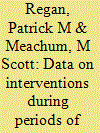

|
|
|
|
|
| Publication |
2014.
|
| Summary/Abstract |
Interventions into civil conflicts have been the focus of considerable research in recent years, but one of the limitations to many studies has been the emphasis on interventions once a conflict begins. While important, we know that states and other actors often take action prior to the onset of a civil war in hopes of diffusing - or exacerbating - a potentially volatile situation. To date, however, no one has been able to study these pre-conflict interventions because appropriate data did not exist. In this article we introduce a new dataset that fits this specific need. Our data identifies states that are at risk of civil war and codes instances of third-party military, economic, and diplomatic interventions. Based on forecasting models that derive risk scores for all states from 1957 to 2007, we are able to identify those states that are most at risk and provide detailed information about interventions that occur in those states. We include a brief empirical example that applies our new data on interventions to test for their effects on the likelihood of civil war or stability. Consistent with prior arguments regarding interventions during civil wars, we show that military interventions increase the risk of civil war onset, while economic and diplomatic interventions forestall that particular outcome. The limited example highlights just one of the potential uses for our new data. With it at hand, researchers will now have the ability to answer many of the vexing problems surrounding the processes that may or may not lead to civil war.
|
|
|
|
|
|
|
|
|
|
|
|
|
|
|
|
| 2 |
ID:
128859
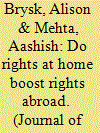

|
|
|
|
|
| Publication |
2014.
|
| Summary/Abstract |
Does women's empowerment strengthen global good citizenship? We test theories of democratic foreign policy and feminist international relations that suggest that more deeply democratic countries with greater gender equity will be stronger international human rights promoters. First, the direct empowerment of women as policymakers and civil society constituencies may shift states' incentives and ability to pursue international human rights initiatives. Second, greater sexual equality may lead to feminist socialization of the wider society to promote human rights values. We test these predictions by measuring the relationship between five different measures of sexual equality and a country's propensity to support 30 international human rights outcomes, including legal commitments, humanitarian assistance, and sanctions, controlling for previously established contributing factors such as level of development and democratic regime type. We find that more sexually equal countries are more likely to support international commitments to constrain state violence against individuals, international measures to combat gender and sexual orientation discrimination, and more and higher quality development assistance. However, sexual equality appears to yield less benefit for more costly human rights initiatives: yielding sovereignty to international legal institutions, promoting economic rights through concessionary trade policies, or adopting diplomatic sanctions against pariah states. These effects are stronger in democratic states, where citizen empowerment translates more readily into foreign policy, and are also found in a sample that excludes the Western powers.
|
|
|
|
|
|
|
|
|
|
|
|
|
|
|
|
| 3 |
ID:
128853


|
|
|
|
|
| Publication |
2014.
|
| Summary/Abstract |
There have been more than 200 wars since the start of the 20th century, leading to about 35 million battle deaths. However, efforts at forecasting conflicts have so far performed poorly for lack of fine-grained and comprehensive measures of geopolitical tensions. In this article, a weekly risk index is derived by analyzing a comprehensive dataset of historical newspaper articles over the past century. News reports have the advantage of conveying information about contemporaries' interpretation of events and not having to rely on meaning inferred a posteriori with the benefit of hindsight. I applied this new index to a dataset of all wars within and between countries recorded since 1900, and found that the number of conflict-related news items increases dramatically prior to the onset of conflict. Using only information available at the time, the onset of a war within the next few months could be predicted with up to 85% confidence and predictions significantly improved upon existing methods both in terms of binary predictions (as measured by the area under the curve) and calibration (measured by the Brier score). Predictions also extend well before the onset of war - more than one year prior to interstate wars, and six months prior to civil wars - giving policymakers significant additional warning time.
|
|
|
|
|
|
|
|
|
|
|
|
|
|
|
|
| 4 |
ID:
128856
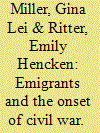

|
|
|
|
|
| Publication |
2014.
|
| Summary/Abstract |
We propose that emigrants affect the likelihood of civil war onset in their state of origin by influencing the willingness of individuals to join rebel movements and the probability that the state and rebels will be unable to reach a mutually acceptable bargain to avoid conflict in three ways. First, migrants communicating with actors at home facilitate valid comparisons between the effects of policies in the home state as compared to policies in the host state enacted on a similar group, creating new motivation to join collective challenges against the state. Second, migrants send remittances, providing resources that can be used in collective challenges that are particularly difficult for states to anticipate, making the outbreak of conflict more likely. Finally, migrants publicize information about conditions in their home state while living in the host state, reducing home government uncertainty such that conflict is less likely to occur. We test these hypotheses on an international dataset and find support for each of our predicted mechanisms.
|
|
|
|
|
|
|
|
|
|
|
|
|
|
|
|
| 5 |
ID:
128854
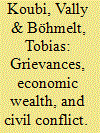

|
|
|
|
|
| Publication |
2014.
|
| Summary/Abstract |
One of the most robust findings in the literature on civil conflicts is that high income levels are associated with a lower risk of conflict onset. This article addresses the wealth-conflict link and discusses it in relation to the dominating `greed vs. grievance' dichotomy. It is further argued that the effect on conflict of grievances, in the form of horizontal inequalities, is conditioned on national wealth. More specifically, there may be a higher risk of civil war in those countries that have much wealth, but where a large share of the population is potentially excluded from accessing it. The empirical analyses testing this argument employ time-series cross-section data for 1951-2004 and find support for the theory. The authors also show that taking this conditional relationship into account improves our ability to predict the onset of civil conflict.
|
|
|
|
|
|
|
|
|
|
|
|
|
|
|
|
| 6 |
ID:
128860
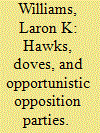

|
|
|
|
|
| Publication |
2014.
|
| Summary/Abstract |
Parliamentary regimes offer the unique opportunity for opposition parties to react to foreign policy by proposing no-confidence motions (NCMs). The threat of an NCM bringing down the government may be enough to induce pacific behavior by the executive. Yet, this simplistic characterization neglects the possible electoral motivations of opportunistic opposition parties. I develop a theory that opposition parties respond to involvement in international conflict by proposing NCMs as a tool to influence voters' opinions with an eye toward the next election. I develop two expectations based on policy disagreement and issue ownership that I use to explain the electorally motivated decision to propose NCMs following conflict. I test these expectations with a dataset of 14 European parliamentary democracies from 1970 to 2001. The empirical evidence suggests that the partisanship of both the government and opposition parties interact to create varying electoral incentives to propose NCMs based on issue ownership. Right-wing opposition parties are more likely to challenge than left-wing parties, and this effect is exacerbated when facing left-wing governments. This study has important implications that underpin a number of theories of the domestic causes of international conflict as well as implications for the study of party strategy.
|
|
|
|
|
|
|
|
|
|
|
|
|
|
|
|
| 7 |
ID:
128858
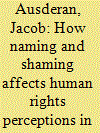

|
|
|
|
|
| Publication |
2014.
|
| Summary/Abstract |
Although individual citizens perceive the human rights conditions in their country differently, existing research on human rights and public opinion has tended to ignore the possible impact from international sources of information. This article builds upon previous research on human rights, public opinion, and international organizations by arguing that citizens will perceive the human rights conditions in their country more negatively when their country is shamed by the international community for human rights violations. This hypothesis is tested using both observational and experimental methods. I use multilevel modeling and survey responses from both the Gallup International Millennium Survey and the World Values Survey to show that individual human rights perceptions are negatively related to the adoption of resolutions by the United Nations Commission on Human Rights shaming a survey respondent's government for human rights abuses, as well as the number of human rights-focused international nongovernmental organizations with members or volunteers living within the survey respondent's country. These results are supplemented by an original, web-based experiment on human rights perceptions in the United States and India in which survey respondents are exposed to an experimental manipulation modeled on press statements from Amnesty International shaming the survey respondent's country for human rights abuses.
|
|
|
|
|
|
|
|
|
|
|
|
|
|
|
|
| 8 |
ID:
128855


|
|
|
|
|
| Publication |
2014.
|
| Summary/Abstract |
The impact of inequality on the outbreak of intrastate armed conflicts or civil wars has recently attracted considerable interest in conflict research. In contrast to previous studies that have focused on inequality in the total population (vertical inequality), recent studies have analysed inequality between certain groups of people (horizontal inequality), and found that inequality significantly increases the likelihood of conflict onset. However, most of the recent studies on the inequality-conflict nexus have focused on conflicts fought between ethnic groups. The relation between inequality and other (non-ethnic) categories of conflicts has attracted less attention. The present study aims to address this gap: it implements a theoretical and empirical analysis of the relation between inequality and popular rebellions, a subset of conflicts where mobilization transcends ethnic boundaries and hostilities involve popular participation. Based on a sample of 77 popular rebellions and new global data on vertical inequality in income and education, this study shows that inequality significantly increases the likelihood of popular rebellion onset. In addition, the study reveals that inequality proxies (income and education Gini indices) outperform proxies of the absolute level of income (GDP per capita) in the model of popular rebellion onset, suggesting that it is relative, not absolute, well-being that ultimately motivates people to rise up in arms.
|
|
|
|
|
|
|
|
|
|
|
|
|
|
|
|
| 9 |
ID:
128857


|
|
|
|
|
| Publication |
2014.
|
| Summary/Abstract |
Previous research has uncovered only ambiguous evidence of the mechanisms that support or inhibit democratic trajectories in the aftermath of civil war. Here I suggest that one specific form of transnational aid during a civil war may have reverberating consequences after the fighting stops. Specifically, when a state emerges to control the executive after a conflict with the help of a previous interstate enemy, the leadership is vulnerable to political attacks on their patriotism and judgment. As such, open democracy becomes a less attractive option for these executives. I investigate this proposition using difference-in-difference matching estimation, as well as several alternative specifications. The findings strongly suggest the presence of disincentives to democratize for those executives that received help from external rivals. This research provides a new set of tools for identifying the causes and potential remedies to deficient democracy after civil wars.
|
|
|
|
|
|
|
|
|
|
|
|
|
|
|
|
|
|
|
|
|